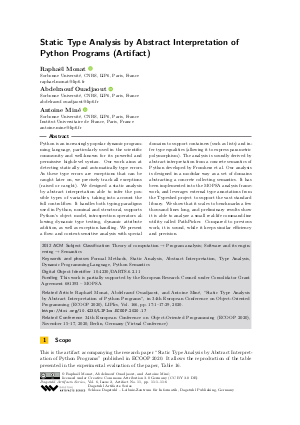Static Type Analysis by Abstract Interpretation of Python Programs (Artifact)
Authors
Raphaël Monat  ,
Abdelraouf Ouadjaout
,
Abdelraouf Ouadjaout  ,
Antoine Miné
,
Antoine Miné 
-
Part of:
Issue:
Special Issue of the 34th European Conference on Object-Oriented Programming (ECOOP 2020)
Part of: Volume: DARTS, Volume 6 (ECOOP 2020)
Part of: Conference: European Conference on Object-Oriented Programming (ECOOP)
Part of: Journal: Dagstuhl Artifacts Series (DARTS) - License:
 Creative Commons Attribution 3.0 Unported license
Creative Commons Attribution 3.0 Unported license
- Publication Date: 2020-11-06
Artifact Description

PDF
DARTS.6.2.11.pdf
- Filesize: 0.52 MB
- 6 pages
Document Identifiers
Subject Classification
ACM Subject Classification
- Theory of computation → Program analysis
- Software and its engineering → Semantics
Keywords
- Formal Methods
- Static Analysis
- Abstract Interpretation
- Type Analysis
- Dynamic Programming Language
- Python Semantics
Metrics
- Access Statistics
-
Total Accesses (updated on a weekly basis)
0PDF Downloads0Metadata Views
Abstract
Python is an increasingly popular dynamic programming language, particularly used in the scientific community and well-known for its powerful and permissive high-level syntax. Our work aims at detecting statically and automatically type errors. As these type errors are exceptions that can be caught later on, we precisely track all exceptions (raised or caught). We designed a static analysis by abstract interpretation able to infer the possible types of variables, taking into account the full control-flow. It handles both typing paradigms used in Python, nominal and structural, supports Python’s object model, introspection operators allowing dynamic type testing, dynamic attribute addition, as well as exception handling. We present a flow- and context-sensitive analysis with special domains to support containers (such as lists) and infer type equalities (allowing it to express parametric polymorphism). The analysis is soundly derived by abstract interpretation from a concrete semantics of Python developed by Fromherz et al. Our analysis is designed in a modular way as a set of domains abstracting a concrete collecting semantics. It has been implemented into the MOPSA analysis framework, and leverages external type annotations from the Typeshed project to support the vast standard library. We show that it scales to benchmarks a few thousand lines long, and preliminary results show it is able to analyze a small real-life command-line utility called PathPicker. Compared to previous work, it is sound, while it keeps similar efficiency and precision.
Cite As Get BibTex
Raphaël Monat, Abdelraouf Ouadjaout, and Antoine Miné. Static Type Analysis by Abstract Interpretation of Python Programs (Artifact). In Special Issue of the 34th European Conference on Object-Oriented Programming (ECOOP 2020). Dagstuhl Artifacts Series (DARTS), Volume 6, Issue 2, pp. 11:1-11:6, Schloss Dagstuhl – Leibniz-Zentrum für Informatik (2020)
https://doi.org/10.4230/DARTS.6.2.11
BibTex
@Article{monat_et_al:DARTS.6.2.11,
author = {Monat, Rapha\"{e}l and Ouadjaout, Abdelraouf and Min\'{e}, Antoine},
title = {{Static Type Analysis by Abstract Interpretation of Python Programs (Artifact)}},
pages = {11:1--11:6},
journal = {Dagstuhl Artifacts Series},
ISSN = {2509-8195},
year = {2020},
volume = {6},
number = {2},
editor = {Monat, Rapha\"{e}l and Ouadjaout, Abdelraouf and Min\'{e}, Antoine},
publisher = {Schloss Dagstuhl -- Leibniz-Zentrum f{\"u}r Informatik},
address = {Dagstuhl, Germany},
URL = {https://drops.dagstuhl.de/entities/document/10.4230/DARTS.6.2.11},
URN = {urn:nbn:de:0030-drops-132082},
doi = {10.4230/DARTS.6.2.11},
annote = {Keywords: Formal Methods, Static Analysis, Abstract Interpretation, Type Analysis, Dynamic Programming Language, Python Semantics}
}
Author Details
Funding
This work is partially supported by the European Research Council under Consolidator Grant Agreement 681393 - MOPSA.
Artifact
DARTS-6-2-11-artifact-c275ca7c1de3b346fe30bf52625a818b.ova
(Filesize: 6.04 GB)
MD5 Sum:
c275ca7c1de3b346fe30bf52625a818b
(Get MD5 Sum)
Related Article
- Raphaël Monat, Abdelraouf Ouadjaout, and Antoine Miné, "Static Type Analysis by Abstract Interpretation of Python Programs", in 34th European Conference on Object-Oriented Programming (ECOOP 2020), LIPIcs, Vol. 166, pp. 17:1 - 17:29, 2020. https://doi.org/10.4230/LIPIcs.ECOOP.2020.17
References
-
Davide Ancona, Massimo Ancona, Antonio Cuni, and Nicholas D. Matsakis. Rpython: a step towards reconciling dynamically and statically typed OO languages. In DLS, pages 53-64. ACM, 2007.

-
Levin Fritz and Jurriaan Hage. Cost versus precision for approximate typing for Python. In PEPM, pages 89-98. ACM, 2017.

-
Aymeric Fromherz, Abdelraouf Ouadjaout, and Antoine Miné. Static value analysis of Python programs by abstract interpretation. In NFM, volume 10811 of LNCS, pages 185-202. Springer, 2018.

-
Mostafa Hassan, Caterina Urban, Marco Eilers, and Peter Müller. MaxSMT-based type inference for Python 3. In CAV (2), volume 10982 of LNCS, pages 12-19. Springer, 2018.

-
M. Journault, A. Miné, R. Monat, and A. Ouadjaout. Combinations of reusable abstract domains for a multilingual static analyzer. In Proc. of the 11th Working Conference on Verified Software: Theories, Tools, and Experiments (VSTTE19), pages 1-17, July 2019.

- Pytype. https://github.com/google/pytype, 2019. Accessed: 2019-10-22.
